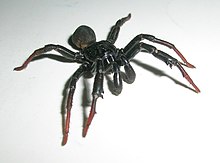Idiopidae
| armored trapdoor spiders | |
|---|---|

| |
| Idiops constructor, male | |
| Scientific classification | |
| Domain: | Eukaryota |
| Kingdom: | Animalia |
| Phylum: | Arthropoda |
| Subphylum: | Chelicerata |
| Class: | Arachnida |
| Order: | Araneae |
| Infraorder: | Mygalomorphae |
| Clade: | Avicularioidea |
| Family: | Idiopidae Simon, 1889 |
| Diversity | |
| 20 genera, 387 species | |

| |
Idiopidae, also known as armored trapdoor spiders,[1] is a family of mygalomorph[2] spiders first described by Eugène Simon in 1889.[3] They have a large body similar to tarantulas.
Description

In some species the males have a spur on their legs, which they will show if provoked.[4]
Idiopidae build burrows, and some species close these with a door.
The about 2 cm long Prothemenops siamensis from Thailand builds its retreat in a streamside vertical earth bank in lower montane rain forest. Each burrow had two or three entrances that lead into a main tube. Its lateral posterior spinnerets are elongated.[5]
The oldest known idiopid died at the age of 43 years.[6]
Genera
As of April 2019[update], the World Spider Catalog accepts the following genera:[7]
- Arbanitis L. Koch, 1874 — Australia
- Blakistonia Hogg, 1902 — Australia
- Cantuaria Hogg, 1902 — New Zealand, Australia
- Cataxia Rainbow, 1914 — Australia
- Ctenolophus Purcell, 1904 — South Africa
- Eucyrtops Pocock, 1897 — Australia
- Euoplos Rainbow, 1914 — Australia
- Gaius Rainbow, 1914 — Australia
- Galeosoma Purcell, 1903 — South Africa, Mozambique, Botswana
- Genysa Simon, 1889 — Madagascar
- Gorgyrella Purcell, 1902 — Zimbabwe, Tanzania, South Africa
- Heligmomerus Simon, 1892 — Africa, Asia
- Hiboka Fage, 1922 — Madagascar
- Idiops Perty, 1833 — South America, Africa, Asia, Saint Vincent and the Grenadines
- Idiosoma Ausserer, 1871 — Australia
- Neocteniza Pocock, 1895 — Central America, South America
- Prothemenops Schwendinger, 1991 — Thailand
- Scalidognathus Karsch, 1892 — India, Sri Lanka
- Segregara Tucker, 1917 — South Africa
- Titanidiops Simon, 1903 — Morocco
See also
References
- ^ American Arachnological Society Committee on Common Names of Arachnids (2003). Common Names of Arachnids (PDF) (Report) (Fifth ed.).
- ^ Raven, R.J. (1985). "The spider Infraorder Mygalomorphae (Araneae): cladistics and systematics". Bulletin of the American Museum of Natural History. 182.
- ^ Simon, E. (1889). Arachnides.
- ^ Find-a-spider Guide
- ^ Murphy, Frances; Murphy, John (2000). "An Introduction to the Spiders of South East Asia". Malaysian Nature Society Kuala Lumpur.
- ^
Leanda Denise Mason, Grant Wardell-Johnson, Barbara York Main (2018). "The longest-lived spider: mygalomorphs dig deep, and persevere". Pacific Conservation Biology. doi:10.1071/PC18015.
{{cite journal}}: Cite has empty unknown parameters:|day=and|month=(help)CS1 maint: multiple names: authors list (link) - ^ "Family: Idiopidae Simon, 1889". World Spider Catalog. Natural History Museum Bern. Retrieved 2019-04-21.
External links
Wikispecies has information related to Idiopidae.
Wikimedia Commons has media related to Idiopidae.
- Find-a-spider Guide: Images of several species
